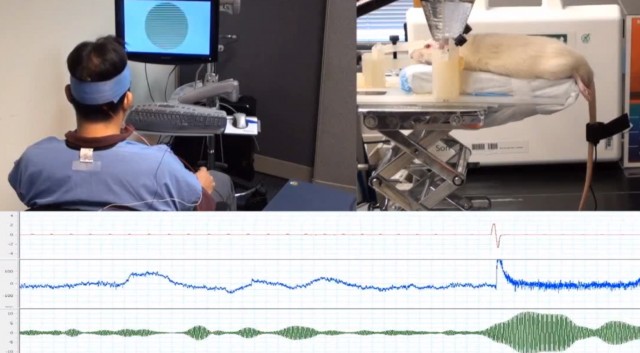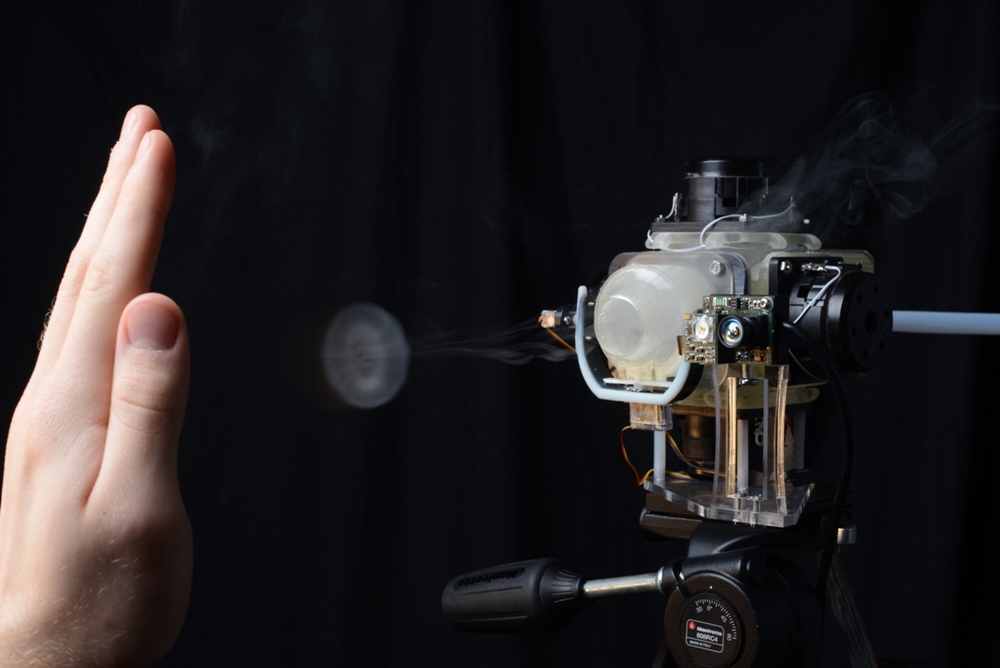
'Light At The End Of The Tunnel' Explained. The Science Behind Near Death Experiences
Many people claim to see a bright light at the end of a tunnel on their deathbeds. Those of us with religious beliefs see this as the light of heaven; but researchers have discovered new evidence that proves otherwise, claiming these visions may be caused by Electrical surges in the brain.

Researchers Create Wrist Device That Predicts How Long You'll Live
Researchers at Lancaster University have created a wrist device that can tell a person how long they will live. This optimistic little device is called the "Endotheliometer," and in their own words, it's "the thermometer of the 21st century."

Researchers Create Brain-To-Brain interface. Control Animals With Thought
Harvard University researchers have created the world's first non-invasive brain-to-brain interface between a human and a rat. Simply put, you can control the rat with thoughts, making for a both fascinating-yet-terrifying discovery (hello Nineteen-Eighty Four). This is a critical step towards technology allowing for telepathic links between human beings.

Disney's 'AIREAL' Air Cannons Let You Feel The Digital World
Disney Research has unveiled a new haptic technology named AIRE AL, using cannons that fire compressed air to simulate the sense of touch.

World's Smartest Artificial Intelligence Computer Is As Smart As A Four Year Old
One of the world's smartest computers took an IQ test, did rather well for artificial intelligence, scoring as well as a four year old.

British Scientists' Search For Alien Life Renewed With UK SETI Research Network
UK scientists are stepping up their efforts to search for alien life, forming the United Kingdom Search for ExtraTerrestrial Intelligence (UK SETI) Research Network. Academics from various British institutions have banded together to form a "small but active group of SETI researchers in the UK, who need a forum to discuss their work."

Study Claims Lego Faces Look Angrier Than Ever
Researchers have identified that smiling, happy Lego characters are becoming less and less common.

Teenagers Losing Interest In Facebook. Interest In Alternatives Rise
Facebook may still be the most popular social network amongst teenagers, new findings from the Pew Research Centre suggests their interest and enthusiasm for the network is decreasing.

Seven Million People In UK 'Have Never Used The Internet'
Research by the Office for National Statistics shows more than seven million adults in the UK have never used the internet.
Currently 43.5 million adults are now online, which is one million more than this same time last year. However, 7.1 million remain offline, with the elderly and disabled least likely to be connected.
Doctors Say Playing Tetris Could Cure Eye Ailments

A while ago we saw how action-packed games can help kids with dyslexia. Now videogames have revealed yet another way in which they are a miracle, as a research team led by Dr. Robert Hess from McGill University Health Centre is using the timeless classic Tetris as part of a new treatment for adult amblyopia, more commonly known as "lazy eye".
'Playfun' Computer Program Teaches Itself To Play NES Games

Tom Murphy has created a computer program that learns how to play classic NES games on its own. The software, named 'Playfun,' uses pre-recorded snippets of gameplay and its own emulator to determine the best course of action when faced with obstacles, teaching itself along the way.
Stanford Creates A Transparent Brain. Analyse The Mind Like Never Before

Combining neuroscience and chemical engineering, researchers at Stanford University have developed a process to render entire brains transparent - allow researchers to analyse grey matter to a level of detail never seen before.
Astronomers Trace Origin Of Russian Meteor

A team of astronomers have tracked down the origin of a meteor that hit Russia, injuring about 1,000 people earlier this month.
Using the thounsands of videos footage posted online, chronicling the strike, the team plotted the meteor's trajectory through the Earth's atmosphere, reconstructing it's orbit around the Sun and tracing it to a source of origin.
Microsoft Predicts The Future Using News Headlines Of The Past

Scientists from Microsoft Research and the Technion-Israel Institute of Technology have developed software, which could predict future events such as disease outbreaks with 70%-90% accuracy.
£1 Billion Supercomputer To Reconstruct And Simulate 'Entire Human Brain'

An international group of researchers have secured over £1 billion to fund the incredibly ambitious 'Human Brain project.' Scientists will spend the next decade understanding, mapping, and virtually simulating the network of over a hundred billion neuronal connections that illicit thought, emotion, and consciousness.

The Internet Is Redefining Human Identity In The UK
Social networks, games, and internet hyperconnectivity is changing notions of identity in the UK, according to a report from the British government's chief scientist.
'Star Wars' Got It Wrong. What Jumping To Hyperspace Would Actually Look Like

As is commonplace in science fiction, when a spacecraft makes the "jump to lightspeed," stars in the galaxy stretch in front of your eyes. But University of Leicester students have calculated what you would actually see when travelling through space at the speed of light.

UK University To Research Stroke Victim Recovery Using The Kinect
Nottingham Trent University is to conduct research using Microsoft's Kinect to help stroke victims.
The Science Of How Comment Trolls Influence Your Opinion

It's almost second nature to expect a series of trollish comments below any science story published on the internet. Generally, we like to think that these responses don't influence us; but this couldn't be further from the truth. New research from the University of Wisconsin-Madison shows that their tone can actually impact readers' opinions about the subject of the article.

Over 13,000 People In The UK Still Watch Black And White Television
Figures released today by the TV Licensing authority show more than 13,000 households across the UK are still using black and white television sets.

